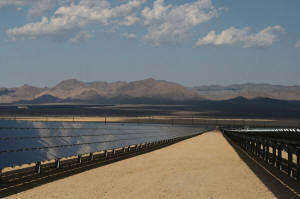|
The
dour forecast by industry trade group the Solar Energy
Industries Association and research firm Wood Mackenzie comes as
solar companies are seeking to take advantage of generous
subsidies in the Inflation Reduction Act (IRA), a new law that
encourages clean energy technologies to address climate change.
Installations of utility-scale projects, in particular, will
contract by 40% this year from 2021 to 10.3 gigawatts, according
to the quarterly report.
Big projects for utilities and other large customers make up the
largest part of the U.S. solar market. Commercial and community
installations are also expected to decline, though the
residential market is forecast to surge 37%.
Overall, U.S. installations are expected to fall 23% to 18.6 GW.
Supply constraints are expected to last until the second half of
next year and delay the effects of the IRA, the report said.
More than 1,000 shipments of solar energy imports worth hundreds
of millions of dollars have piled up at U.S. ports since the
Uyghur Forced Labor Protection Act went into effect in June. The
detainments have halted new shipments as manufacturers fear
additional cargoes will also be seized.
The UFLPA requires producers to show sourcing documentation of
imported equipment back to the raw material before imports can
be cleared. That has proven more difficult than solar companies
expected, SEIA said.
"In the aftermath of the Inflation Reduction Act (IRA), we
cannot afford to waste time tinkering with trade laws as the
climate threat looms," SEIA President Abigail Ross Hopper said
in a statement.
The report expects the market to return to growth next year,
with annual increases of 21%, on average, between 2023 and 2027.
(Reporting by Nichola Groom; Editing by David Gregorio)
[© 2022 Thomson Reuters. All rights
reserved.] Copyright 2022 Reuters. All rights reserved. This material may not be published,
broadcast, rewritten or redistributed.
Thompson Reuters is solely responsible for this content.

|
|




